Jun 22, 2025 – Inauguration of Model Kitchen in Zhobka Chiwog, Visit to Gelephu Mindfulness City
Hello. Today, Sunim went to Zhobka Chiwog to hold the inauguration ceremony for the model kitchen built by JTS and had conversations with the residents. Afterward, he visited Gelephu Mindfulness City and had a discussion with the governor.
Sunim departed for Zhobka Chiwog at 5 a.m. The weather was humid with thick fog, making visibility poor. He took a brief rest in the car, closing his eyes for a moment.
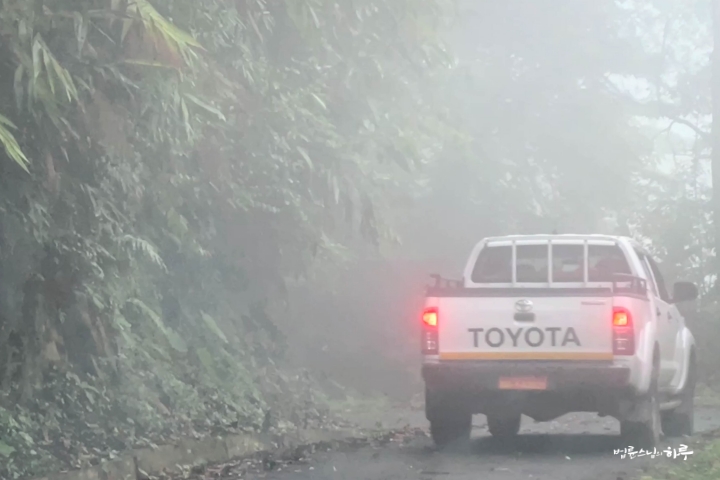
Zhobka Chiwog is the most remote village in Zhemgang District, about a two-hour drive from Pantang Chiwog where the JTS volunteers’ accommodation is located. The volunteers had stayed in Zhobka Chiwog for about two months, installing two model kitchens and conducting home improvement work and shelf-making training.
Sunim arrived at Zhobka Chiwog at 7 a.m. The village Tshogpas who had participated in yesterday’s workshop were already waiting for him.
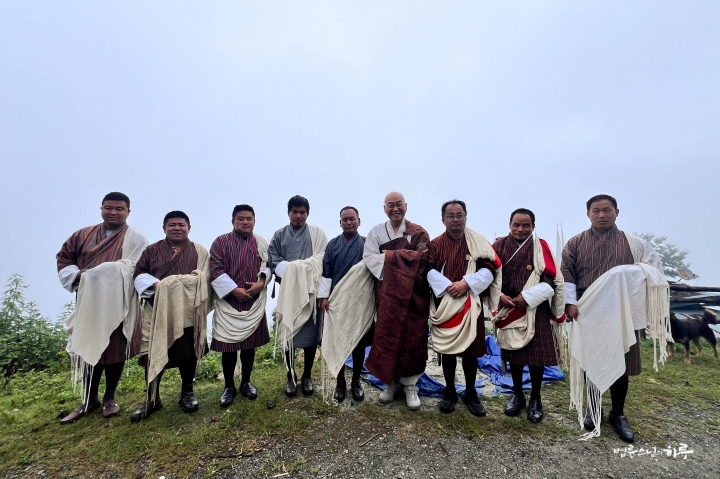
Upon arriving at the house where the model kitchen was installed, the inauguration ceremony began. First, Sunim sprinkled milk with floating flowers at the kitchen entrance while offering blessings.
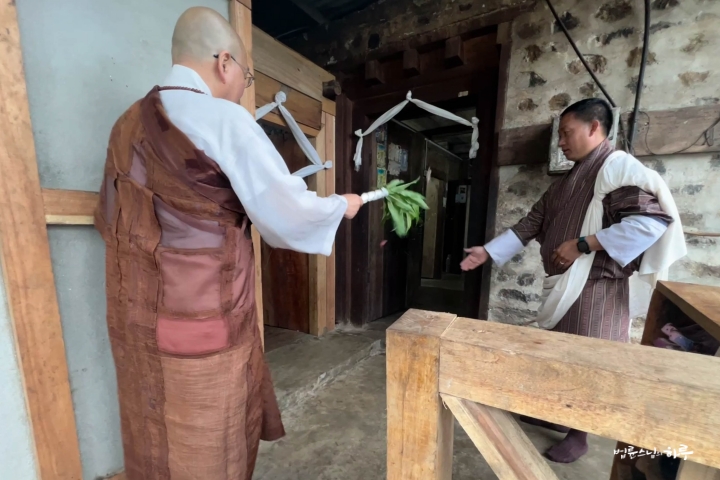
Then, together with the Deputy Governors of Zhemgang District, he untied the white cloth hanging on the door.
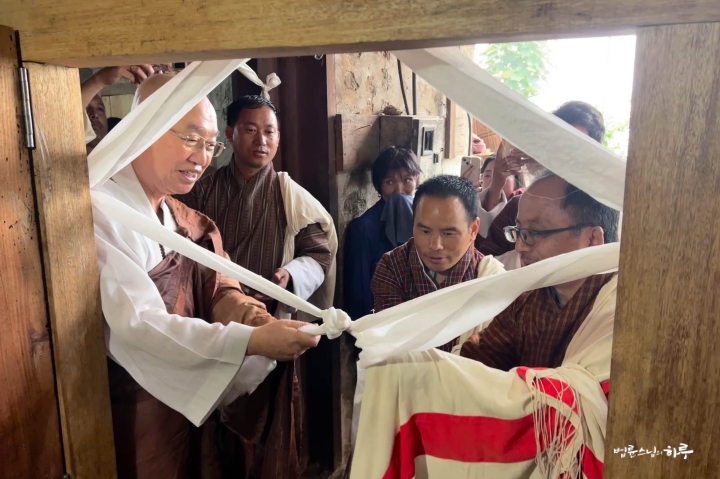
This house belonged to a single-parent family whose husband had died of heart disease three years ago, leaving the wife to raise the children alone in difficult circumstances. When JTS volunteers first came to propose kitchen improvements, she had initially refused, feeling burdened by the construction work.
The original kitchen had no running water connection, requiring water to be fetched from a tap outside the house, and the interior was always filled with smoke. During this model kitchen construction, water pipes were connected and a sink was installed, allowing direct water use inside the kitchen. A new stove and chimney were also built to safely exhaust indoor smoke to the outside.
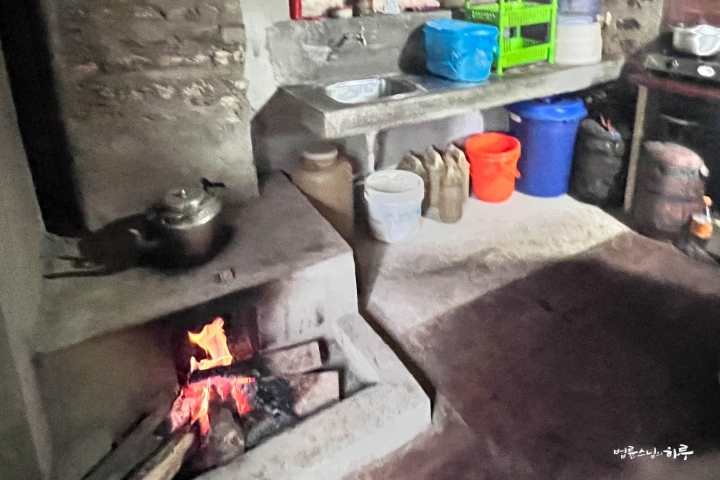
Sunim asked the homeowner:
“I heard you were initially burdened by the kitchen construction? How was it after doing it?”
“I was worried because there was no one to help, but the JTS volunteers and villagers helped a lot, so we were able to finish it well.”
“You’ve done a great job. Thank you for your hard work. But the smoke exhaust pipe is a bit short. You need to extend it beyond the roof so the roof won’t turn black from smoke.”
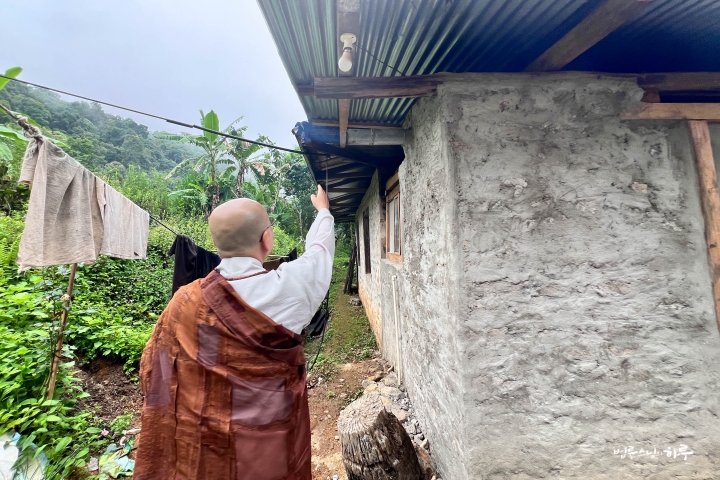
Soon after, they moved to the second house where a model kitchen was installed and held the inauguration ceremony. First, JTS volunteer Lee Mi-eun, who was in charge of the overall construction, explained the progress of the work.
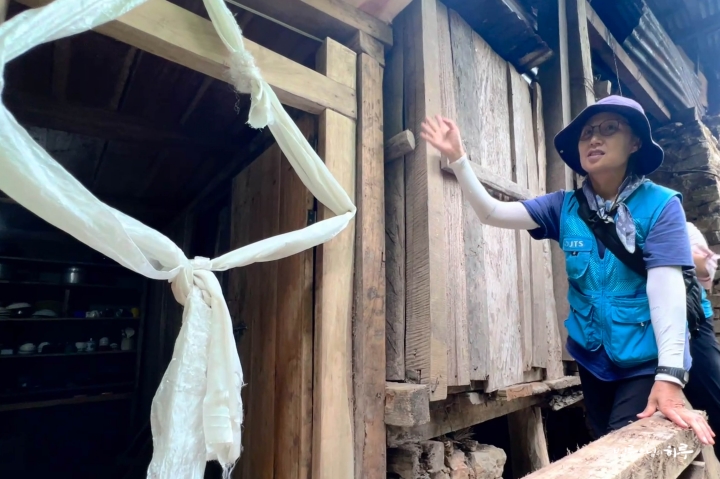
Next, together with the Deputy Governors, they untied the white cloth hanging on the door.
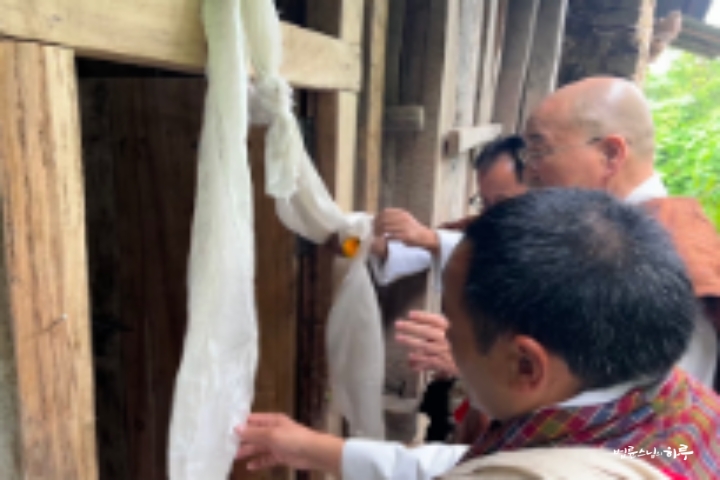
Then they carefully examined every corner of the kitchen.
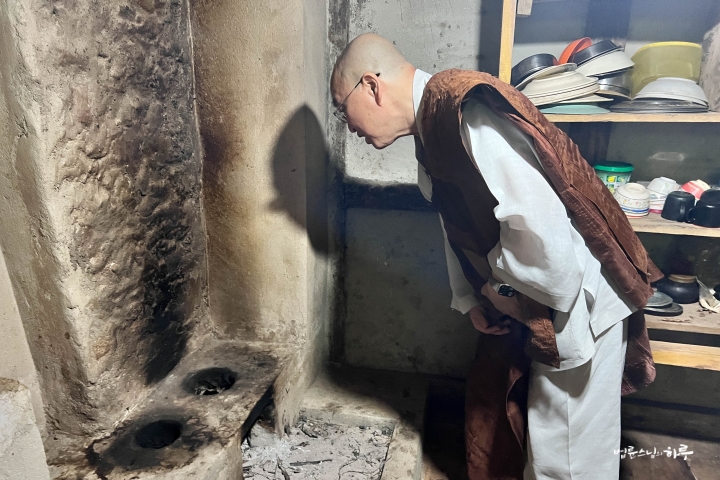
“The stove width is narrow. Let’s make it a bit wider next time. The firewood should be used inside the stove, and the burner should be made curved so smoke doesn’t leak when pots are placed on it.”
Sunim asked the homeowner:
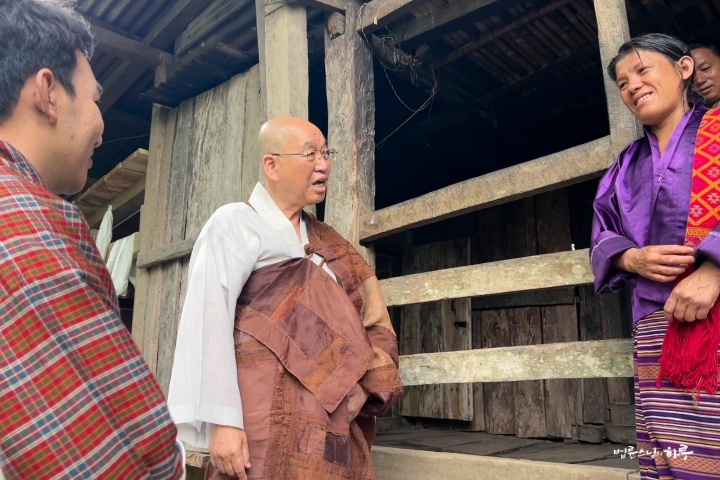
“Is it good after using it? Are there any inconveniences?”
“It’s good. There are no inconveniences.”
“You’re not just unable to say it, are you?” (laughter)
“No, there aren’t any.” (laughter)
Starting at 7:40 a.m., Sunim had a conversation with about 30 villagers who had contributed to the model kitchen construction. It had been six months since Sunim last visited this village in December. He explained in detail what JTS wanted to do together with the villagers.
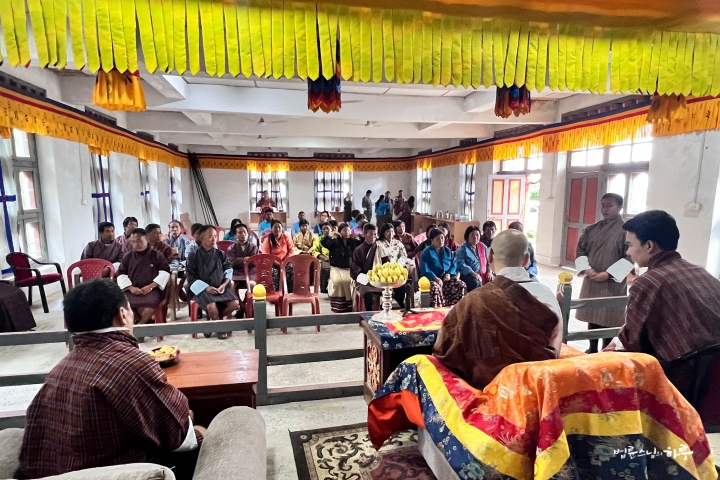
“What JTS wants to do with you is to live a little more conveniently and cleanly, even if we are poor. The goal is not to become rich. Becoming rich is something each of you can work on yourselves. (laughter)
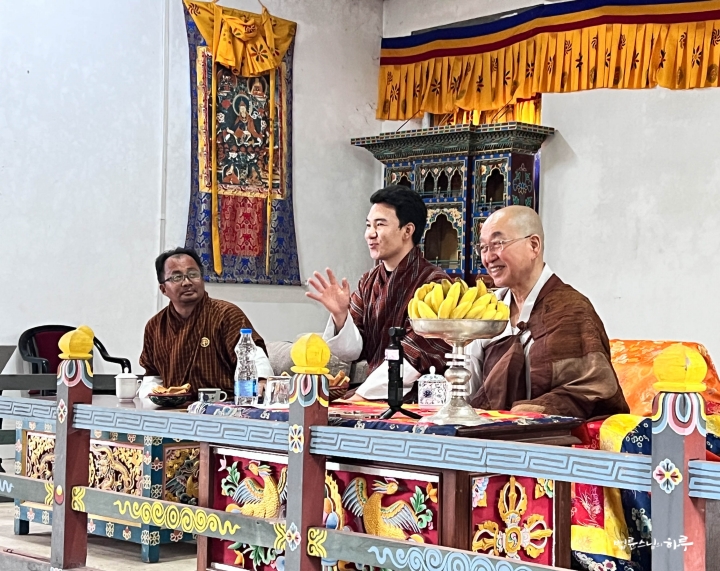
The first goal of this project is to have at least the minimum basic living conditions for eating, clothing, and shelter. To solve the food problem, we need to put up fences to keep out wild animals, and to get water into the rice fields, we need to install irrigation channels. For living, we need houses, and inside them, there should be kitchens and toilets. Those without houses need to build even small ones. Even those with houses often have unorganized interiors. If there are no partitions, we need to install them, and shelves should be mounted to organize belongings. Windows need insect screens to keep bugs out. Kitchens need sinks and shelves for dishes. These days, with electricity available, if you don’t need wood-burning stoves, you can remove them from inside the house. But if elderly people still want to cook with wood, we need to make chimneys so smoke doesn’t enter the house. Toilets should be clean, and if there’s a water tap outside the house, cement should be applied around it to prevent muddiness. Since it’s slippery when it rains, the paths between houses should also be paved.
Even If We Are Poor, We Can Live More Conveniently and Cleanly
This project is a kind of ‘New Village Movement’ to renovate our village. So we first repaired two houses as a pilot. One house had no doors or windows, so we installed all new ones and built a new kitchen. It was built cleanly using dry wood. The other house had a new kitchen and toilet built, but the finish was a bit disappointing because the wood wasn’t dry. To make it neat, the wood should be cut along the grain and dried for at least a month before working with it.
You can also look around these two houses directly, and if you haven’t been able to properly furnish your home due to poverty, you can apply saying ‘I’d like to renovate my house like that.’ You can follow these two houses as examples, or if you have better ideas, please suggest them. This project is a movement to improve living conditions. We especially want to help improve the lives of women who mainly handle kitchen work. This time we only renovated two houses as a pilot, but in the future, JTS will provide materials, so I hope you can create even better improvements yourselves.
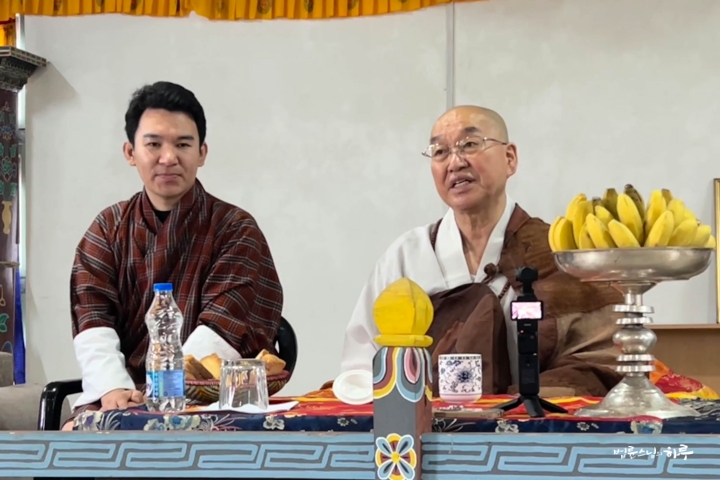
I Fix My Own House: A Self-Reliance Project of Learning and Working Together
This project is not about someone doing the work for you. Each of you must do it yourselves. However, since you may not be in a position to obtain the materials needed for this project, JTS will provide the materials. Without the willingness to do it yourself, if you just say ‘Please do it for me!’, it will be difficult to receive support. On the other hand, if you actively participate saying ‘I will do it!’, you can receive the necessary materials.
Building a house is not something one can do alone, so villagers must cooperate with each other. Those with technical skills should help with the parts that require expertise, and at the same time, everyone needs to have an attitude of learning together. If you want to learn skills, we will teach you the techniques and provide the necessary tools. So please have the mindset of ‘I fix my own house.’ While you may need a carpenter’s help to build the frame, walls, and roof, you can certainly build toilets and kitchens yourselves. If two or three households work together, set an order, and help each other, you can gradually fix each of your houses.
JTS will provide items that need to be purchased, such as sinks and cement. You must prepare anything else that you can obtain directly yourselves. By dividing roles and cooperating like this, I hope you can make your homes cleaner and more convenient.
When we fixed two houses this time, did the residents cooperate with each other? Did all of you at least carry a stone?”
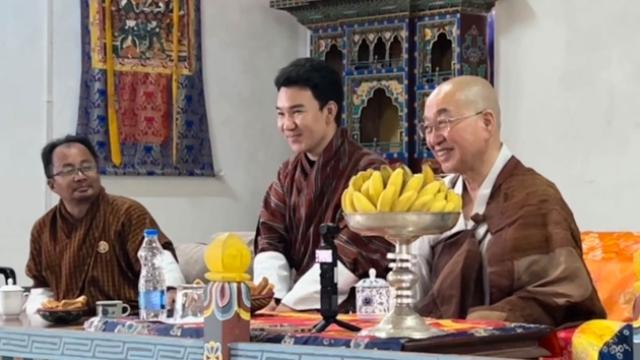
“Yes, we helped each other.”
“Thank you for helping each other like this. I would like to give each of you a bar of soap as a gift for your hard work. May this merit bring health and comfort to everyone. Let us chant together.”
After chanting together, Sunim presented a bar of soap to each villager who participated in the project.
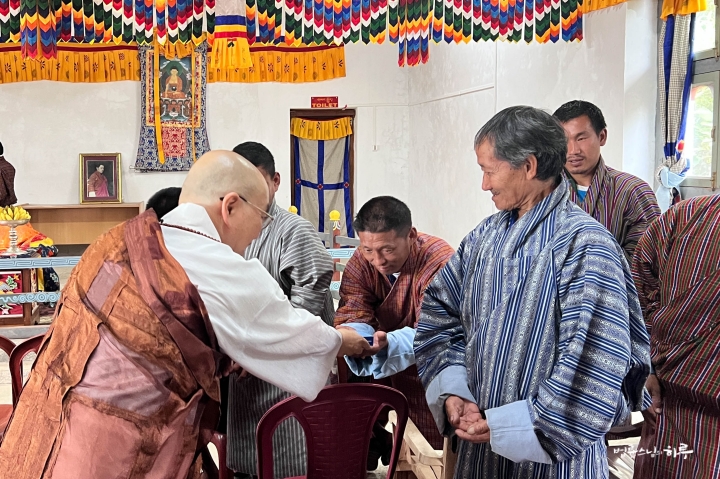
Babralji and Mahendraji, who had volunteered in Bhutan for two and a half months for the house repair project, approached Sunim to greet him. Sunim offered them words of encouragement for their hard work.
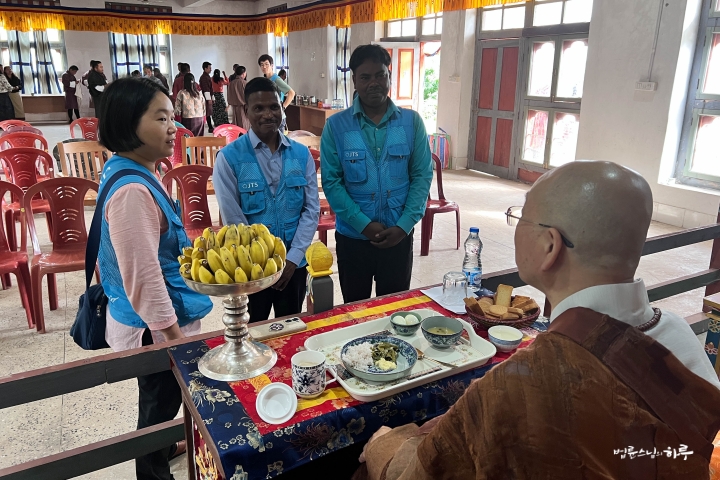
“You worked very hard. Wasn’t the work difficult?”
“Yes, it was a bit difficult. For the second house, the wood wasn’t completely dry, so planing was difficult. We were disappointed that the finish wasn’t as clean as we hoped.”
“Making money is important, but volunteering like this is also meaningful, isn’t it?”
“Yes, it is.”
“So will you come back to volunteer again?”
“No.” (laughter)
“Why not?”
“Volunteering is good, but now I need to earn money to arrange my son and daughter’s marriages.”
“Your son and daughter are learning well in school, so wouldn’t it be okay to let them live on their own now?”
“Sunim, we’re not in a position to just let our children be. To marry off my daughter, I need to prepare a dowry, so I must continue earning money.”
“I see. If you volunteer a lot in places like this, you’ll accumulate merit and good things will happen later. To become a JTS member, you need to learn various skills. You can’t have just one skill. When you return to India, learn various skills. Thank you for your hard work.”
“Yes, I understand.”
After exchanging greetings, they had breakfast prepared by the Gewog and departed for their next destination, Gelephu, at 8 AM. Around noon, they had lunch in Tingtibi, prepared by the Zhemgang Dzongdag. Having heard that the volunteers had difficulty obtaining vegetables in Bhutan, the Dzongdag thoughtfully prepared a meal with various vegetables.
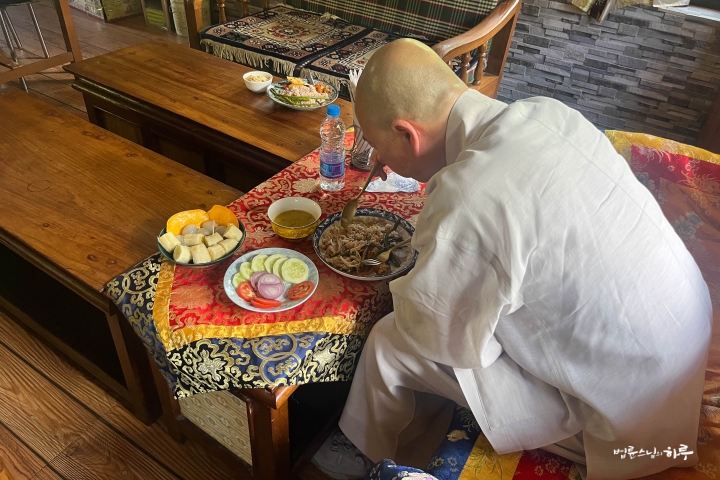
After finishing the meal, they got back in the car and arrived in Gelephu at 3:30 PM. Upon arrival, Sunim had a conversation with Dasho Lotay Tshering, the current Gelephu Dzongdag and former Prime Minister of Bhutan.
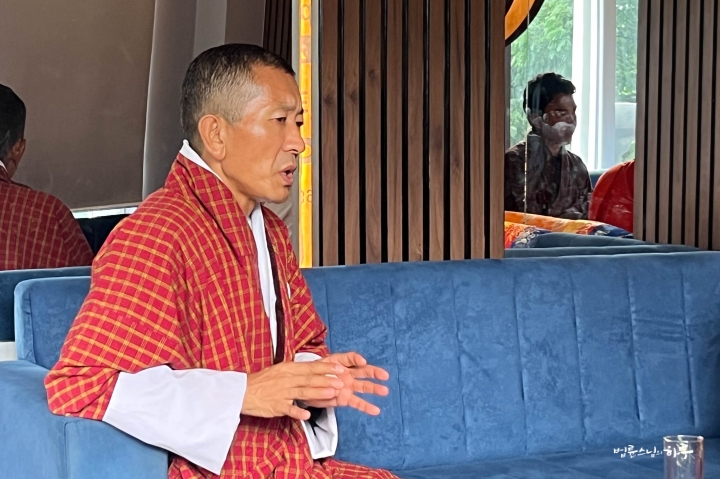
Sunim listened to the Dzongdag’s explanation about the Gelephu Mindfulness City that the Bhutanese government is developing. The Gelephu Mindfulness City is a large-scale international free city being developed in the Gelephu region of southern Bhutan, designed as a new urban model with ‘mindfulness’ based on nature and spirituality as its core value. It aims for sustainable development centered on ecological preservation and local communities. Sunim emphasized the need for a meditation center within Gelephu.

“If the sustainable development project in Zhemgang is successfully established, it can spread as a model for poverty eradication throughout Bhutan. Not only poverty eradication, but a meditation center for those who are mentally exhausted is also essential. I will also visit Gelephu about once a year to see how things are progressing.”
After the conversation, Sunim presented the English edition of “Revolutionary Buddha” to the Dzongdag.
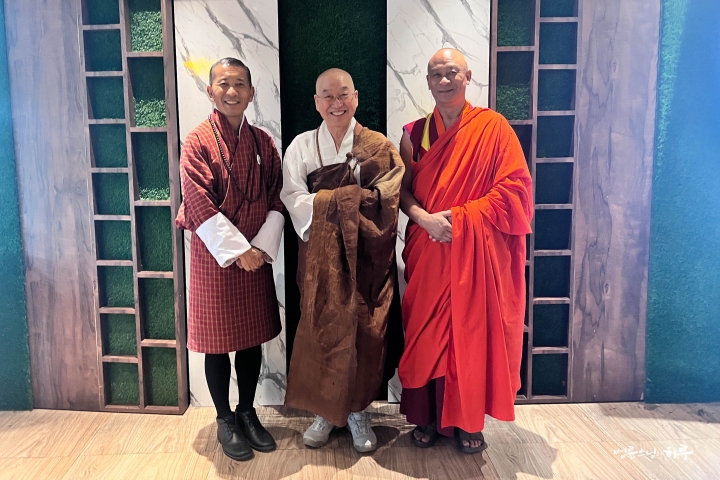
At 4:30 PM, Sunim departed for Tsirang to survey a school site for female monastic practitioners (nuns). Unlike the mountain roads traveled in Bhutan so far, this time open plains stretched out before them.
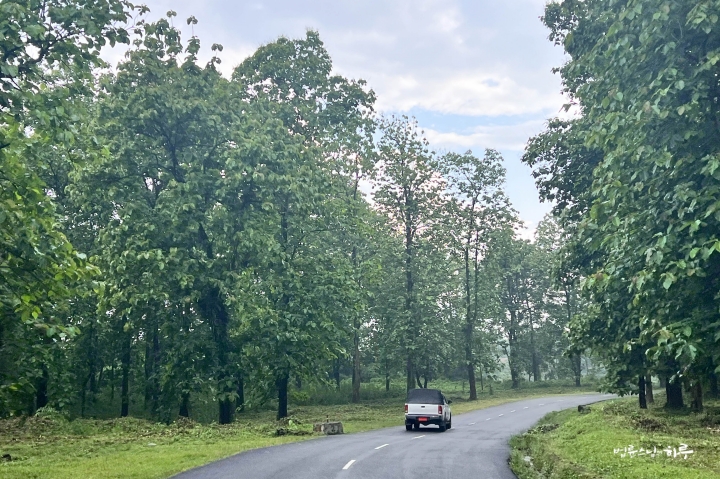
After driving on flat roads for about an hour, the car turned onto winding mountain roads again. As the altitude increased, thick fog began to set in. Soon visibility became so poor it was difficult to see ahead.
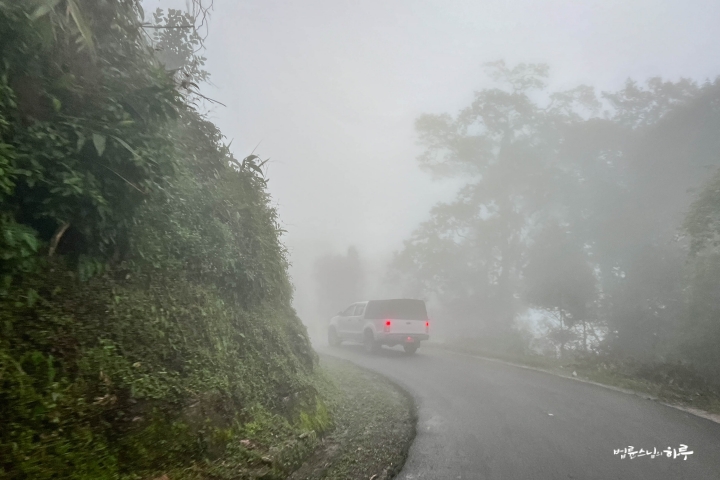
At 7:10 PM, they met Tashi, the Secretary General of the Bhutan Nuns Foundation, in Damphu, Tsirang. They drove together for another hour and a half on unpaved mountain roads to reach their destination, Lamoizingkha village in Dunglagang Gewog.
The journey that began at 5 AM finally ended close to 9 PM. Sunim and his group arrived at their accommodation, had dinner, and concluded the day.
Tomorrow, after surveying the school site for female monastic practitioners in Tsirang with Dr. Tashi Zangmo of the Bhutan Nuns Foundation, they will move to Thimphu to sign an MOU (Memorandum of Understanding) with the Bhutanese government for sustainable development.
Since there was no Dharma talk today, I’ll conclude by sharing a conversation between a questioner and Sunim from the online Friday Dharma Q&A held on the 13th.
I Keep Thinking That I Might Have Made a Mistake
I’m curious about how I can break free from this suffering. On the other hand, I think that no matter how careful we try to be, since it’s human work, mistakes can happen. But since nursing deals with life, I’m very afraid when medication-related mistakes occur. If such mistakes happen, I wonder if the only way is to first apologize to the patient and supervisor, and then resolve it legally. Actually, if I made a mistake, I should just admit ‘I was wrong,’ but since this matter is related to life, it’s even more frightening.”
“From what you’re describing, you’re experiencing symptoms of anxiety. Normal people might feel anxious briefly after making a mistake, but they forget about it over time or feel fine after sleeping. However, you keep replaying the incident, and when similar situations arise, you become anxious again. This isn’t just a personality issue; it’s a symptom of mental anxiety. Instead of just worrying about what to do, if you’re concerned about rumors, go to a neuropsychiatry department at another hospital for consultation. The doctor will conduct some tests and prescribe medication if necessary. When you take the medication, these anxious thoughts will disappear. It won’t prevent you from making mistakes, but the anxiety and nervousness about making mistakes will go away.
Everyone can make mistakes in life. Even doctors sometimes leave scissors inside the body during surgery and sew it up, only discovering it later through X-rays. There have been mistakes where gauze inserted to clean up bleeding was accidentally left inside the body before suturing, and many other types of mistakes can occur. We think such things are unbelievable, but when there are many people and work is repetitive, these things can actually happen. The doctor might have drunk alcohol the night before or simply forgot. Of course, if this happens frequently, you should quit nursing. But if it happens once or twice a year, it can happen to anyone. If you made a mistake, you get scolded, and if compensation is needed, you compensate. It’s not that big of a deal. But because you’re so anxious about it, it’s become an illness. That level can be called anxiety disorder. So don’t just worry about it – go to the hospital for a diagnosis and try taking stabilizers. If you take medication, the anxious thoughts can disappear, so you don’t need to worry too much.
And you need to do a lot of prostrations. People with anxiety need to exercise consistently. Lower body exercise is especially important. Walking a lot, doing prostrations, or riding a bicycle at the gym are all good. According to modern medical research, mental health is closely related to lower body health. When lower body muscles become strong, you become mentally stable too. Doing prostrations consistently is good, but even if not, developing a habit of walking around the neighborhood for 30 minutes a day or doing lower body-focused exercise is beneficial. Walking is the most convenient and effective, but realistically it’s not easy due to lack of time or suitable environment. Still, secure walking time as much as possible, and take medication if necessary. Then it won’t be a big problem.”
“Thank you. I listened well to your words, Sunim. The phrase ‘it can happen while doing things’ really resonated with me. I went to a psychiatrist once last year, and the doctor said it wasn’t that severe and didn’t prescribe medication. So I’ve been doing prostrations diligently, but as you said, I’ll also pay attention to lower body exercise from now on.”
“Still, at your current state, you should take medication. Go to the hospital once more. Even taking mild medication can reduce recurring anxiety. Anyone can make mistakes, and anyone can forget. But people with anxiety are always nervous about losing things or making mistakes. So unless the doctor says you absolutely don’t need to take medication, I recommend taking it even lightly. If you go to the hospital again now, I think the doctor will prescribe medication. Of course, if you take too much medication, you can become drowsy and lethargic. Even if you’re a bit drowsy, it’s much better if your mind is stable. It’s good if sleep comes naturally, but when you can’t sleep well, it’s okay to drink a glass of wine or take a mild stabilizer and sleep soundly. Getting enough sleep reduces anxiety. Conversely, if you can’t sleep late at night, anxiety increases. The habit of working late and going to bed at one or two in the morning doesn’t help mental health. You should develop a habit of going to bed before 11 PM at the latest.”
“Yes, I understand. Thank you.”





